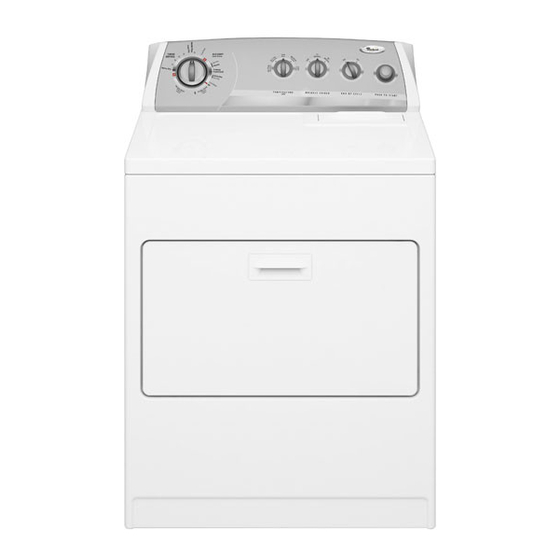Whirlpool YLER4000RQ1 Instrukcje użytkownika - Strona 5
Przeglądaj online lub pobierz pdf Instrukcje użytkownika dla Suszarka Whirlpool YLER4000RQ1. Whirlpool YLER4000RQ1 16 stron.

6. Select thedesired O ption. See "Dryer Cycle Descriptions"
(separate sheet).
7. Ifdesired, addfabric softener sheet. Use only ones labeled a s
dryer s afe. F ollow package instructions.
8. Push theSTART button.
Stopping and Restarting
You can stop your dryer anytime during a cycle.
To stop your dryer
Open the dryer door or turn the Cycle Control knob to OFE
NOTE: The Cycle Control knob should point to an Off area when
the dryer is not in use.
To restart your dryer
Close the door. Select a new cycle and temperature (if desired).
Push the START button.
Use the Drying Rack to dry items such as sweaters and pillows
without tumbling. The drum turns, but the rack does not move.
If your model does not have a drying rack, you may be able to
purchase one for your model. To find out if your model allows drying
rack usage and for ordering information, please refer to the front
page of your manual or contact the dealer from whom you
purchased your dryer.
NOTE: The rack must be removed for normal tumbling. Do not
use the automatic cycle with the drying rack.
To use the drying rack
1. Place drying rack in dryer.
Style 1: Your drying rack has front legs. Slide rear pegs into
the dimples on the back wall of the dryer. Lower the front legs
to rest on the dryer opening.
Style 2: Your drying rack does NOT have front legs. Do not
remove the lint screen. Slide drying rack over the bottom of
the dryer door opening. Push down to secure rack on frame.
2. Put wet items on top of rack, leaving space between items.
Do not allow items to hang over the edge of the rack. Close
the door.
3. Select a timed drying cycle and temperature, or an air cycle.
Items containing foam, rubber, or plastic must be dried on a
clothesline or by using an air cycle. Refer to the following
table.
4. Start the dryer. Reset cycle to complete drying, if needed.
Rack Dry
Cycle
Temp
Time
Washable wool items (block
Timed
Low
60 rain.
to shape, lay flat on rack)
Drying
Stuffed toys/pillows
(cotton
Timed
Low
60 min.
or polyester filled)
Drying
Stuffed toys/pillows
Air
N/A
90 min.
Foam rubber filled
(no heat)
DRYERCARE
.....,
%
Clean the lint screen before each load. A screen blocked by lint
can increase drying time.
IMPORTANT:
•
Do not run the dryer with the lint screen loose, damaged,
blocked, or missing. Doing so can cause overheating and
damage to both the dryer and fabrics.
•
If lint falls off the screen into the dryer during removal, check
the exhaust hood and remove the lint.
Every Load Cleaning
Style 1:
1. The lint screen is located on top of the dryer. Pull the lint
screen toward you. Roll lint off the screen with your fingers.
Do not rinse or wash screen to remove lint. Wet lint is hard to
remove.
2. Push the lint screen firmly back into place.
Style 2:
1. The lint screen is located in the door of the dryer. Pull the lint
screen straight up. Roll lint off the screen with your fingers. Do
not rinse or wash screen to remove lint. Wet lint is hard to
remove.
2. Push the lint screen firmly back into place.
As Needed Cleaning
1. Wet both sides of lint screen with hot water.
2. Wet a nylon brush with hot water and liquid detergent. Scrub
lint screen with the brush to remove residue buildup.
3. Rinse screen with hot water.
4. Thoroughly dry lint screen with a clean towel. Replace screen
in dryer.
Explosion
Hazard
Use nonflammable
cleaner.
Failure to do so can result in death, explosion, or fire.
1. Apply a non-flammable
household cleaner to the stained area
of the drum and rub with a soft cloth until stain is removed.
2. Wipe drum thoroughly with a damp cloth.
3. Tumble a load of clean cloths or towels to dry the drum.
NOTE: Garments which contain unstable dyes, such as denim
blue jeans or brightly colored cotton items, may discolor the dryer
interior. These stains are not harmful to your dryer and will not
stain future loads of clothes. Dry unstable dye items inside-out to
prevent dye transfer.
